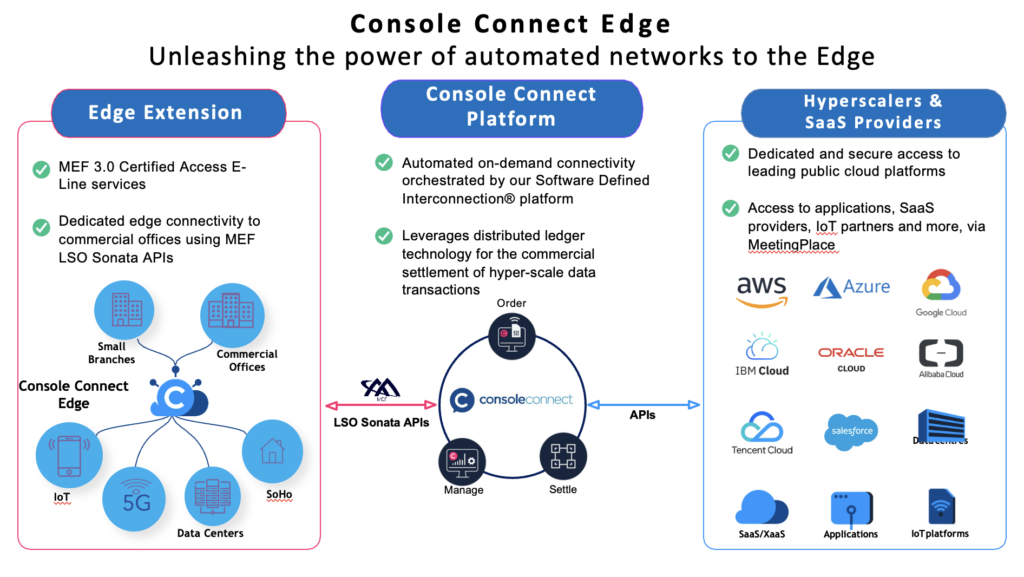
on Posted on Reading Time: 4 minutes
Information and Communication Technology Service Providers (ICT-SPs) across the world are at different stages of their digital transformation journey. Some are busy automating their network core or migrating to a software-defined core, while others are further along their journey and are exploring ways to integrate their automated networks with hyperscalers to offer Network as a Service (NaaS) and cloud connectivity.
These increasing levels of network automation are already starting to deliver benefits for carriers, particularly as they develop new ways to orchestrate connectivity and increase interoperability between different networks.
However, a lot of NaaS offerings are still limited to data center connectivity, leaving out a large and important slice of the addressable market segment and preventing enterprise customers from buying directly from NaaS providers or ICT-SPs. As enterprise workloads move closer to the network edge, network automation capabilities need to move beyond the data center and access enterprise buildings across the globe.
Lessons from our own automation journey
There has been much work going on behind the scenes to reach this stage of network automation evolution.
Console Connect’s automaton journey began in 2017, when PCCW Global acquired the startup Console Connect and rolled out a software-defined networking (SDN) overlay that fully automates all switching and routing across our global network.
This was no easy task given the scale of our global network infrastructure. We own and manage one of the world’s most diverse global fiber networks, which includes a leading IP, MPLS, and Carrier Ethernet network. Our Layer 2 network alone includes 18 terabytes of edge capacity.
This network is today available on-demand to Console Connect users, who are able to spin-up and pay for services via a web portal or API. The platform provides direct access to all major hyperscale cloud providers and is available in more than 800 data center locations worldwide.
In addition to this automated network fabric, over the years we have established partnerships with hundreds of regional and local services providers for downstream last-mile connectivity from our data centers into enterprise buildings. While a majority of these regional partners offered manual pre-order and order processes, several others with automated processes offered proprietary APIs for ordering Carrier Ethernet products. Onboarding individual regional carriers onto the automated platform was challenging, mainly because each such implementation is unique and time and resource intensive. Adoption of MEF Sonata Interface Reference Points (IRPs) and standards-based LSO APIs can help address some of these challenges.

API standards hold the key
Another important focus area for Console Connect has been around the development and adoption of API standards.
API standards are critical for bringing down the barriers for automated interconnection between networks and developing a common set of languages for developers and engineers.
Thankfully, adoption of the MEF Sonata API standards is gathering pace. Console Connect and more than 34 service providers worldwide are already in production with or plan to implement LSO APIs for automating inter-provider transactions by the end of 2023.
There are some convincing reasons and long-term drivers for adopting API standards, which include:
- Reduced complexity: Open APIs make it easier for platforms like Console Connect to seamlessly offer services across a partner’s network like it is our own (and vice versa).
- Reduced cost: Many operators spend considerable amounts of their IT budgets on integration and customization. APIs help significantly reduce the this cost.
- Increased efficiency: APIs remove considerable layers of paperwork and human error from the provisioning and settlement of network services.
- Faster time to market: Traditional manual service provisioning between networks can take a number of weeks or months. APIs can reduce this to minutes or even seconds.
- Economies of scale: Ultimately APIs can lead to greater productivity and lower costs for end users.
But API standards are also helping Console Connect extend its network automation capabilities beyond the data center and bring our on-demand offerings closer to the network edge.
Introducing Console Connect Edge
By leveraging MEF LSO Sonata APIs and riding on the orchestration-ready MEF 3.0 Certified Carrier Ethernet (CE) services, Console Connect is expanding its on-demand footprint beyond traditional data centers and privately connecting thousands of enterprise buildings across the globe through dedicated ethernet connectivity.
Using LSO Sonata APIs, Console Connect is automating its pre-order and order processes with several of its existing regional and local service partners to procure last-mile Access E-Line services for its enterprise customers.
By leveraging standardized LSO Sonata API adapters, Console Connect was able to integrate up to 16 regional partners within a space of few months. This integration expands our footprint well beyond our 800+ Console Connect-enabled data centers into the network edge. This takes our on-demand offering to the enterprise buildings, where the customer’s workloads reside.
This also opens the door for enterprise customers to order on-demand connectivity services right up to the network edge using the same Console Connect portal where they can order data center-to-data center connectivity and direct, on-demand cloud connections.
While the network core can be provisioned in real-time, the provisioning of dedicated edge connectivity may require some manual backend provisioning. But this process is very seamless and transparent to the enterprise customer and allows them to take advantage of the same portal to order on-demand networking services—even if they have no presence at one of Console Connect’s data centers.
For service providers and enterprises who find themselves on a similar digital transformation journey, here are five attributes that have helped us succeed at Console Connect:
- Ensure strong leadership support to drive the digital strategy within the organization
- Adopt a Scaled Agile Framework (SAFe) that provides for a common language and collaboration tools between the development and operational value streams
- Automate the network fabric and make it available on-demand via web portals and APIs
- Fully embrace the cloud infrastructure by migrating your company’s on-premises OSS/BSS applications to public or hybrid cloud
- Leverage open standards-based APIs to create a “meeting place” where buyers and sellers can meet and trade effectively
We will be showcasing our Console Connect Edge service at MEF’s LSO Partners Conference in Paris on 4 May 2022, with the service due be launched later this year. If you are interested in finding out more, please visit the Console Connect stand and speak with our team at the event.

